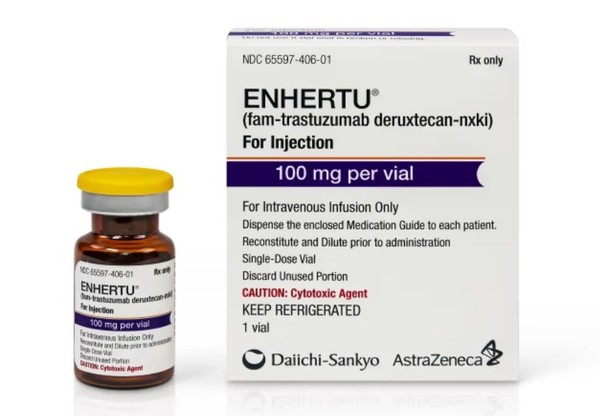The U.S. Food and Drug Administration has approved the application to expand indications for Enhertu (ingredient: trastuzumab deruxtecan) submitted by Daiichi Sankyo and AstraZeneca, industry sources said Thursday.
That means the FDA will decide whether to permit its use for HER2-low metastatic breast cancer patients this year, they added.

In contrast, the Ministry of Food and Drug Safety has yet to approve its use even for HER2-positive breast cancer patients one year after it designated the drug for quick review, raising discontent among patients and doctors.
According to Daiichi Sankyo and AstraZeneca, the FDA accepted their application for expanding Enhertu’s indications to treat HER2-low metastatic breast cancer patients on Monday. The U.S. regulator will conduct a priority review of the drug and decide whether to give final approval this year, the two companies said.
They stressed that the upcoming FDA would screen Enhertu through its Real-Time Oncology Review (RTOR) and Orvis project, designed to provide effective cancer treatments for patients as soon as possible.
In the U.S., the companies obtained Enhertu’s conditional approval in December 2019, based on the results of DESTINY-Breast01 phase 2 clinical trials for unresectable metastatic HER2-positive breast cancer patients’ third or higher treatments. This past May, the FDA finalized its approval of Enhertu for unresectable metastatic HER2-positive breast cancer patients for second or higher treatments based on DESTINY-Breast03 study results.
In the latter trials, Enhertu demonstrated excellent results by reducing disease progress and death risk by 72 percent compared to existing Kadcyla (ingredient trastuzumab emtansine), a first-generation antibody-drug conjugate (ADC). As a result, the two companies immediately broadened the target of Enhertu from HER2-positive breast cancer, which accounts for 15 percent of breast cancer, to HER2-low breast cancer representing 70 percent of all patients.
In contrast, Enhertu has yet to receive an approval even for HER2-positive breast cancer.
The food and drug safety ministry designated it as subject to a fast-track review in June last year but has since made little progress due to Daiichi Sankyo Korea’s insufficient submission of required documents. Nevertheless, the ministry maintains that the timing of its approval depends on the company’s submission of documents.
In the process, complaints are mounting among patients and medical workers.
“Enhertu has demonstrated excellent treatment effects in HER2-positive breast cancer patients and HER2-low metastatic breast cancer patients,” said Professor Sohn Ju-hyuk of oncology at Severance Hospital. “Overseas, the scope of patients who can use the drug rapidly expands, but few Korean patients can use it.”
Professor Chung Kyung-hae of oncology at Asan Medical center said, “Some Korean patients use the drug by acquiring it through the rare drug center. However, due to the prohibitive drug price, it remains a dream treatment for most Korean patients. Domestic patients and doctors are heartbroken by the sad circumstance.”

